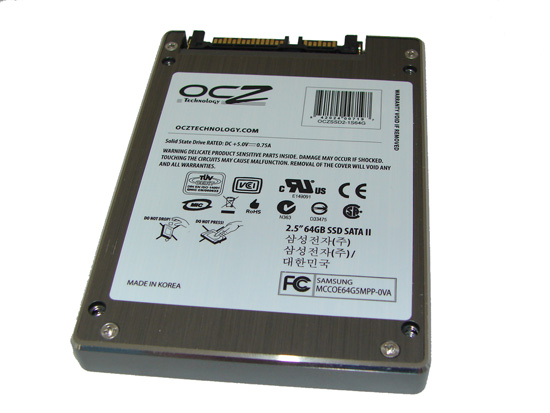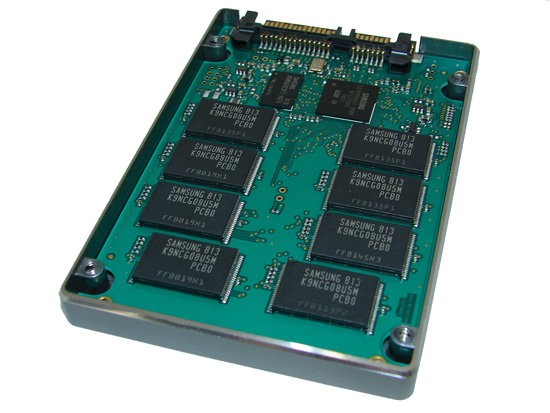64GB SSD on the Desktop: Samsung and OCZ go mainstream
by Gary Key on May 15, 2008 11:30 PM EST- Posted in
- Storage
Specifications
| Specification | |||
| Samsung MCCOE64G5MPP | OCZ Technology OCZSSD2-1S64G | WD VelociRaptor WD3000BLFS | |
| Unformatted Capacity | 64GB | 64GB | 300GB |
| Interface | SATA 3 Gb/s | SATA 3 Gb/s | SATA 3 Gb/s |
| Rotational Speed | n/a | n/a | 10,000 RPM |
| Buffer Size | n/a | n/a | 16 MB |
| Average Latency | n/a | n/a | 2.99 ms (nominal) |
| Read Seek Time | 0.3 ms | 0.3 ms | 4.2 ms |
| Write Seek Time | 0.2 ms | 0.2 ms | 4.7 ms |
| Transfer Rate - Buffer to Disk | 100 MB/s (sustained) | 100 MB/s (sustained) | 120 MB/s (sustained) |
| Number of Heads | n/a | n/a | 4 |
| Number of Platters | n/a | n/a | 2 |
| Command Queuing | n/a | n/a | Native Command Queuing |
| Acoustics - Spec | Idle -
0dBA Seek Mode 0 - 0dBA |
Idle -
0dBA Seek Mode 0 - 0dBA |
Idle -
29dBA Seek Mode 0 - 36dBA |
| Warranty | Variable | 1 - Year | 5 - Years |
| Power Dissipation | |||
| Read/Write | 0.41 Watts | 0.41 Watts | 6.08 Watts |
| Idle | 0.32 Watts | 0.32 Watts | 4.53 Watts |
| Standby | 0.24 Watts | 0.24 Watts | 0.42 Watts |
| . | |||
The Samsung/OCZ drives feature identical hardware no surprise in the specifications being essentially identical. Current Mtron and Memoright drives feature read and write seek times at 0.1ms but their power numbers are generally a few watts higher than the Samsung design. The power dissipation numbers are quoted from Samsung and in our testing we found the idle and standby numbers were accurate but read/write load numbers were around 1.8W, still excellent by any standard. Since the Samsung drive is primarily available in OEM systems, the warranty terms are variable between suppliers. Samsung quotes a MTBF of 2,000,000 hours, which is significantly higher than mechanical drives. We have not received information on the number of times data can be written to each bit or the wear leveling algorithms utilized.


The 2.5" form factor that Samsung/OCZ utilizes is the standard 9mm option found in a majority of notebooks. Our review samples have the right mounting pattern for standard 2.5" platform designs. The circuit board features the NAND flash and controller on a single side along with the SATA power and cable connectors.










38 Comments
View All Comments
ameatypie - Saturday, January 24, 2009 - link
i think in one years time, these are going to be the default laptop hard drives. The price of flash memory is going down so fast..... a year ago, a 4GB flash drive was &70 USD or more.... now you can get em for $5. If that sort of trend continues, we are going to have super-quick laptops in no time at all.....Zak - Monday, May 19, 2008 - link
I remember couple of years ago they were promising huge speed improvement and energy savings but when SSD finally hit the store shelves they're quite underwhelming considering the price. What's most disappointing is almost no improvement in battery life on laptops! At least that's the case with Air. Still, this is new tech so I hope things will get better in the next couple of years, so I'm not writing SSD off yet.Z.
FXi - Monday, May 19, 2008 - link
Would have been helpful if just one fast laptop drive had been included in the mix to see for that segment of users what degree of speedup is gained.I figure you'll get to it in time. These kinds of reviews are far from over :)
MadBoris - Saturday, May 17, 2008 - link
This is solid state?I don't understand how people can look at this as anything but a good tech demo.
Comparing actual physical RAM to a Hard drive is night and day and yet somehow a solid state drive can barely compete or even falls short of a hard drive at times.
Isn't the point of solid state that we all desired for decades the huge performance gains???
Their is something really wrong with this picture when it still can't compete with a hard drive yet costs 4 times as much.
Give me a quality RAM Drive on an OS any day, address the volatility of the RAM or load the ram drive on startup of the computer, using the HD as a cache during startup and shutdown just like sleep does.
Until solid state will improve performance over a hard drive by 2-3 times then it is just a tech demo. I would be happy to have something much smaller and yet much faster memory for installing some programs on, specifically an OS and some main applications, not data.
The good thing is their is great opportunity for competition and advancement in this market. Wake me up when we get there.
Nice article although I disagree it is award worthy as a technology regardless how much improvement took place, their is a galaxy of room left for improvement for it to be worthy of consideration above .01% of consumers.
Harkonnen - Saturday, May 17, 2008 - link
I would love to see Anandtech test out this SSD.http://www.tomshardware.com/reviews/ssd-memoright,...">http://www.tomshardware.com/reviews/ssd-memoright,...
codeThug - Friday, May 16, 2008 - link
About as mainstream as Bigfoot Networks $249.99 Killer NIC M1http://www.newegg.com/product/product.aspx?Item=N8...">http://www.newegg.com/product/product.aspx?Item=N8...
TheriusDrake - Friday, May 16, 2008 - link
I'd love to see the game load times on the fastest Core2 Duo on an Intel and Nivida Mobo to see if there are any major differences in those benchmarks.shabby - Friday, May 16, 2008 - link
Who would spend that much money only to receive 1 year of warranty on the ocz ssd?Arbie - Friday, May 16, 2008 - link
Do the vendors quote these? Are there any verifications / experience? Not one SSD review I've seen has even raised this issue.Of course any drive can fail at any time (random), and all mechanical drives will eventually wear out too. What I'm talking about is unexpectedly near-term, statistically-predictable wearout.
Arbie
chizow - Friday, May 16, 2008 - link
Given the storage demands of the latest HD media and PC games, I just don't see how SSD will overcome standard HDD any time soon. I can see them surpassing HDD in speed, but not both speed with increased storage capacity. And that's before considering pricing. I have a hard time justifying even the $1/GB VelociRaptor nowadays given the price to performance of the larger drives, and that's coming from someone who owns two 150GB Raptors.I think SSD has a much better future serving the performance sector in that gap between DRAM and conventional HDD storage. I'd like to see them get closer to DRAM speed, keeping capacity lower, but perhaps implementing something like integrated RAID to speed things up. As more people move towards 64-bit OS and multimedia apps and games continue to grow, 8GB of RAM may not be enough in the not too distant future. Games are already spilling onto multiple DVDs with install folders easily surpassing 10GB for a single game after patches and expansions.
This may pose a problem for board and dimm makers, as it seems increasing memory capacity is a limitation that can't easily be overcome. Current solutions are limited to 4GB per dimm I believe and server boards with additional dimm slots or daughter cards. Mainstream solutions would be reluctant to adopt these changes as they'd increase cost/size significantly. Introducing a fast, hybrid SSD solution could help bridge the gap between system RAM and HDD storage giving programs faster performance as needed.